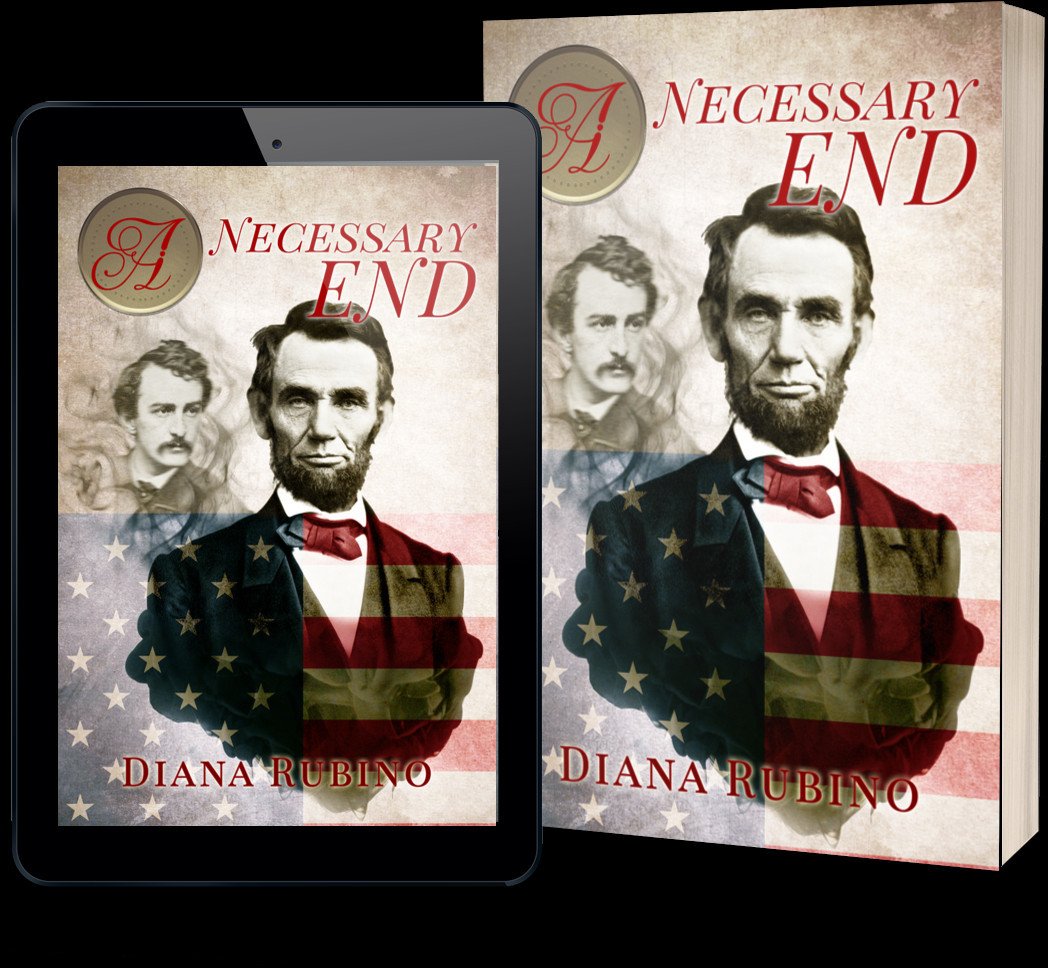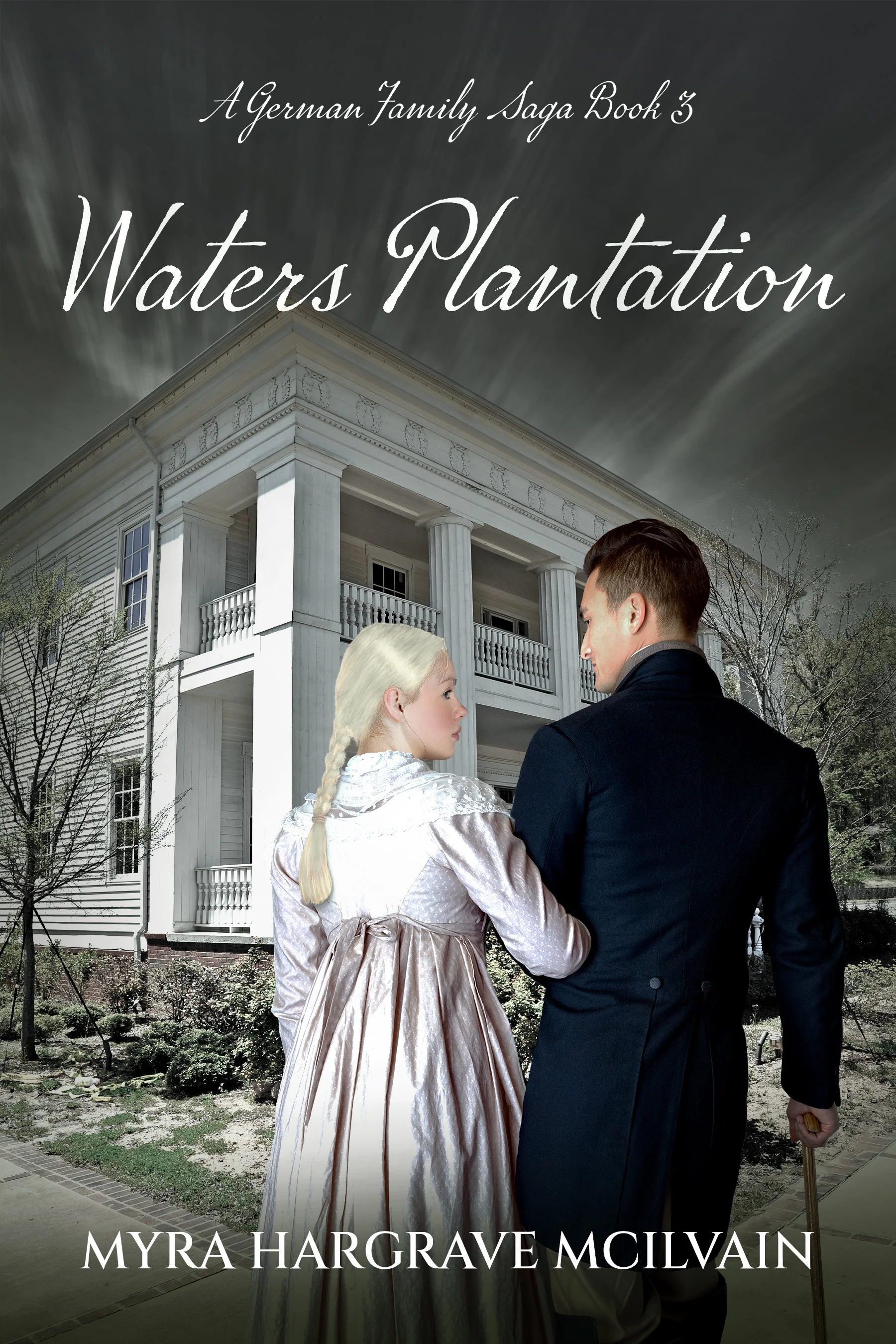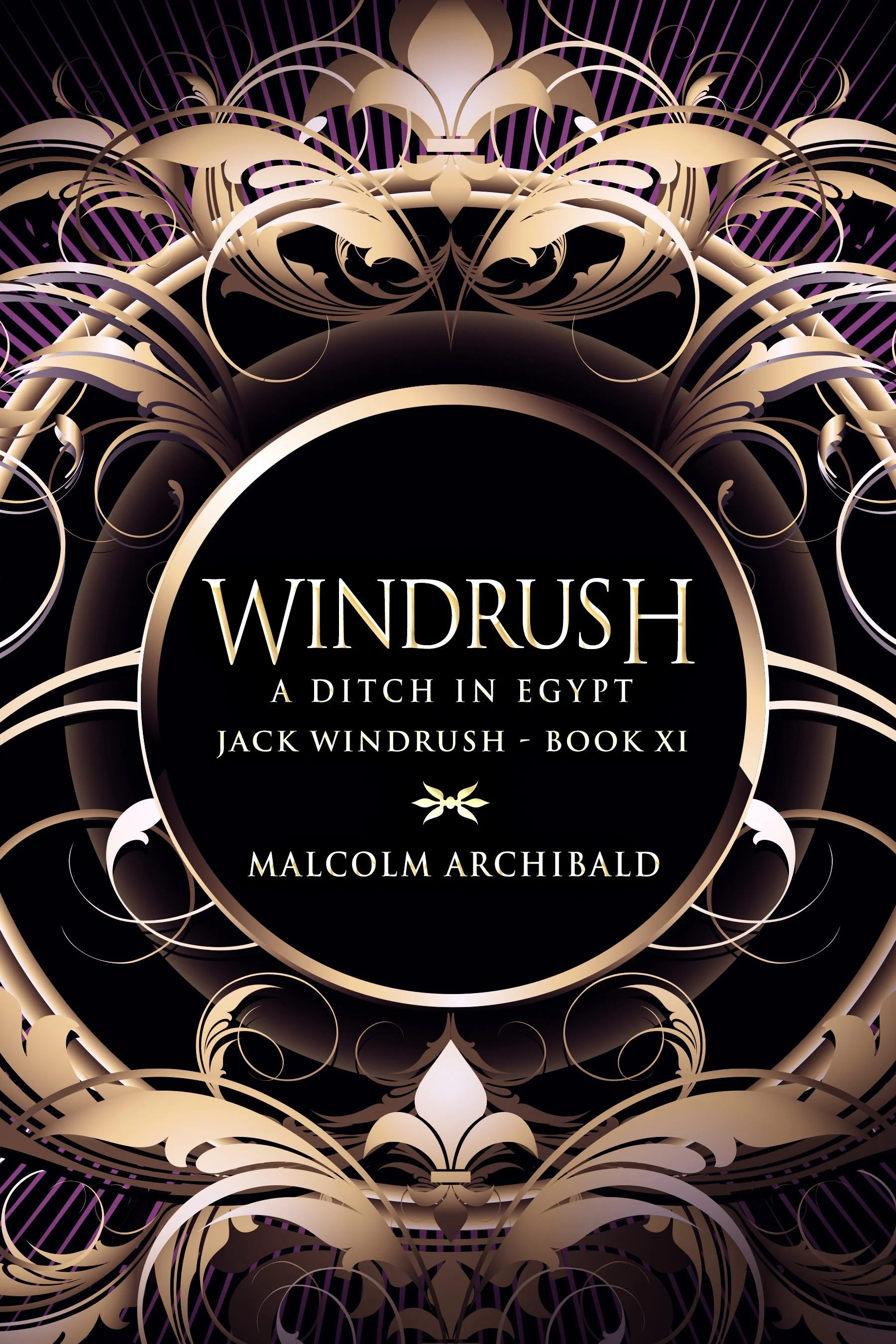A Paranormal Historical Mystery Novel Set In The Civil War
A Necessary End by Diana Rubino
Book excerpt
Prologue
The White House, September 1, 1864
John Wilkes Booth dropped to his knees and looked up into Abraham Lincoln’s weary eyes. “Please, sir, I beg you.” He clasped the president’s hands. “I’m desperate.”
The president leaned forward and expelled a sigh. The gaslight cast a glow over his gangly form, backlighting him like a ghost. “Several officials have asked me the same thing. I know it’s a tragedy for all of us, son, on both sides.”
All dignity and poise forgotten, Wilkes entwined his fingers with the president’s. “We’ve suffered enough heartbreak with this war, Mr. President. You’ve seen our cities in ruins and our people starving. Just this one favor, on behalf of the South, and so many of us will be forever grateful.”
“I would like to,” Lincoln said.“But I’ve already spoken to your future father-in-law, Senator Hale.”
“Sir, those other men were here for political reasons, including Senator Hale. I’m appealing to you on a personal level.”
Regarding Lincoln at close range for the first time, Wilkes saw all the strife and turmoil of the war condensed in those tired gray eyes. Wisdom and fatigue creased his weatherbeaten face.
“I wish I could help you, son, but I can’t grant every favor that I’m asked for. It wouldn’t be fair.”
As an actor, Wilkes knew how to keep his emotions under control. But he saw no reason to put up a facade of composure. This tragedy was real, and more painful than his breaking heart.
“But, sir, what’s fairer than sparing an innocent life?” I understand how you feel, John, but…”
“Please, Mr. President,” he sobbed, his shoulders shaking. “Think of how you’d feel if this were your Robert sentenced to die.”
Something must have struck a chord in Lincoln, because the president’s hands tightened around his. Tears filled Lincoln’s eyes and spilled onto his sunken cheeks.
“All right. I will pardon your friend.” He closed his eyes, his bearded chin almost resting on his chest. “This will cause many repercussions. But at times like this I have to follow my heart.”
Wilkes slowly got to his feet, their hands still clasped, their eyes locked. “Thank you, sir. Some people say you’re two-faced. But I know you follow your conscience and are true to your word.”
“If I were two-faced, would I be wearing this one?” The hint of a smile came to his thin lips.
Wilkes squeezed the president’s hand again, this time in farewell. “You won’t regret it. So many people will be forever grateful to you, I promise. And, again, I’m sorry to have intruded at such a late hour. Good night, Mr. President.”
Lincoln merely nodded.
Wilkes backed out of the office and shut the door. Then he turned around and slumped against the fading, peeling wallpaper, thanking God the president had spared John Beall’s life.
As Wilkes walked the dark halls over the threadbare carpet, he shivered as a cold draft chilled him. How dare the government let this house, the most iconic symbol of American pride, fall into such disrepair. What a disgrace. A pang of sorrow tore at his heart with painful memories of the four-room log home of his birth, his mother’s struggle to feed ten children at the mercy of his father, the brilliant drunkard actor who died penniless. He made a mental note to donate a tidy sum so poor Mrs. Lincoln could purchase some pretty flub-dubs.
Stepping out into the night, he felt the urge to turn back and ask President Lincoln’s forgiveness for the slanderous things he’d said since the war had started. But that was before he saw Lincoln as a man, standing there in a nightshirt, war-torn and exhausted. A father who’d lost thousands of sons.
Before leaving the White House grounds and climbing into his carriage, Wilkes looked over his shoulder at the pale square of light, a lone beacon glowing in that cavernous mansion. He would find a way to repay the president. Somehow, some way, he would repay him.
September 15, 1864
Wilkes flipped through the mail his dresser had brought from Ford’s Theater and sorted it: business mail in one pile, letters of praise in the other. But he saw no letter from his closest friend, John Beall.
Wilkes didn’t really expect one. They’d get together for a saloon crawl soon enough. He chuckled, remembering some of the antics they’d pulled together. They’d been playmates, schoolmates, closer than most brothers.
When Beall was accused of spying for the Confederates and sentenced to hang, Wilkes knew his only chance to save his friend was to beg President Lincoln, to pour out his heart. Beall was a loyal citizen who loved his country, but like some patriots, he just went to extremes. Lincoln’s sparing him the gallows gave Wilkes a new respect for the president. For the first time in four years, his heart lightened. Maybe this was a sign that the horror and bloodshed would soon end.
Nothing else in the mail interested him, so he grabbed the Washington Times and skimmed the front page. An article snagged his eye. He froze, paralyzed. He read it over and over, not believing what he saw. His eyes blurred. Feeling like he’d been punched in the stomach, he doubled over. Dread filled him as if he’d just read his own death sentence.
“I’ve been double-crossed,” he growled through clenched teeth.
John Beall was hanged yesterday at one p.m. on Governors Island, New York.
Chapter One
Washington City, November 1864
I don’t believe in ghosts, Wilkes assured himself as he listened to the high keening of the medium. He shivered as a draft wafted over him. Smoky incense intensified the gloom. He wasn’t at this séance to seek omens or cryptic guidance from beyond the grave. He was attending this charade to learn of Abraham Lincoln’s actions in this world.
He still ached with grief over his boyhood friend’s death. A part of his soul had died along with John Beall, who was everything the South stood for. Rage seized his heart and boiled his blood. How could Lincoln do this to another human being? How could the president look him in the eye and promise he’d let John live, then murder him?
Wilkes fought to subdue these emotions. No phantom held the answers he sought on this bone-chilling night, but the bird-like matron entranced before him, Nettie Colburn Maynard, did. The medium was Mrs. Lincoln’s spiritualist, famed for her evenings at the White House spent “bringing back” their dead boys, Eddie and Willie.
Wilkes had to admit she put on a good show. One thing he appreciated was fine acting. But he was wary. The parlor felt haunted as shadows crept up the walls. The hairs at the back of his neck already stood on end, and a chill slithered through his body. Although his hands were icy, his palms sweated, making them even colder. The room stood silent and musty as a tomb. The dank staleness assaulted him. His throat aching for a trickle of brandy, he coughed.
Mrs. Maynard’s eyes were shut tight, but his own gaze darted about, unable to settle. Candles flickered jagged shadows around the room. Wallpaper patterns swirled into an impenetrable fog. And the curtains…did they flutter, even though the windows were closed?
“A spirit is present, Mr. Booth.” Her voice, almost a whisper, barely reached his ears. She exhaled feathery tendrils of steam in the eerie half-light. “It watches over you, seeks to guide you.” He saw her shoulders shake with violent tremors. “He was powerful in life, but more powerful in death, released of mortal frailty.”
Wilkes felt the dread of approaching harm, but was too spellbound to get up and quit the whole thing. Or was it raw fear that kept him frozen in his seat? His voice, trained in delivery of lines, was suddenly struck silent.
He had to admit she was gifted, the perfect witch for Macbeth. The funereal black dress draped her gaunt figure like a shroud. Shadowed by the pale flames, Mrs. Maynard played her role to perfection. Once again, he convinced himself it was all an act. But if it was real and some being from beyond really did hover over him…
Just then he realized his jaw was tightly clenched. He struggled to slacken it.
“He lived many centuries ago, Mr. Booth, and knew you by another name. He revisits you now, drawn close by your pain and grief.” She shuddered again. Her grip crushed his hand, her knuckles white as bleached bone. “I feel his essence very forcefully, right there…” Her hands turned to ice. “Behind you…”
He nearly ripped a tendon snapping his neck around, but saw neither phantom nor flesh, just movement at the edge of his vision flickering up the wall. Threads of fear tickled at his nerves. Nothing was as it seemed.
Turning to face her again, he felt foolish for succumbing to her trickery. An embarrassed blush heated his cheeks, though the room temperature was plummeting. He breathed deeply to calm his pounding heart.
“He will thrust you toward your true destiny, young man.”
Those words triggered a childhood memory that now returned in full color. In his mind he pictured the old gypsy he’d met at age twelve when he wandered into her wagon at a carnival. “Ah, you’ve a bad hand. The lines all criss-crass!” Her raspy voice had trembled with doom. “It’s full of sorrow. Full of trouble, everywhere I look. You’ll die young, and leave many to mourn you, many to love you, too. You’re born under an unlucky star. You’ll make a bad end. You’ll have a fast life—short, but a grand one. I’ve never seen a worse hand. But a guiding spirit is watching you. He will thrust you toward your true destiny, young man.”
A spirit would guide him toward his destiny, to die for his country. His life’s mission was to avenge John Beall’s murder and repay Lincoln for that heartless act.
A clock’s muffled chime sliced through the silence. Numbness spread over his hands, and a deathly chill crept over his skin. His actor’s brain clutched for the reality he knew best, turning fright to nervous amusement. He scanned the room with professional eyes, but saw no obvious stagecraft. How the devil did she do it?
Ever the leading man, now struggling for control, he summoned his loftiest tone.
“There is nothing behind me, Mrs. Maynard. I don’t see the slightest glimmer of a ghost, and all I heard was your clock chiming.” He breathed a sigh of relief that his voice hadn’t trembled
“That’s odd.” She cocked her head as a pigeon would. “I don’t have a clock that chimes.”
He felt the cold air vibrate as if in answer. Dread flooded him. Once more he gulped the dank air, and then a harsh, rattling moan filled the room. He clapped his hands over his ears to shut out the wail, but the noise seemed to burst from inside his head as well as out. The cacophony subsided to an unworldly voice, part beast, part man. The first utterings were low groans, snarls and a strange whimpering. Was this really a long-silent entity calling from beyond the grave?
“I watch you always,” he heard in an almost human growl. He glanced at Nettie, and was astonished to realize that the discordant voice came from her lips.
“Your love of country is most honorable, and will be your legacy to history.”
The voice was clearer now, though it still sounded parched from the dust of centuries of disuse. It was a vibrant, powerful man’s voice.
“This payment is yours now, as it was once before. It is my token. My bane on tyranny,” the voice cajoled. “I offer you my part in your noble deed to come. Take it. Use it well, my brother.” Then a metallic chittering broke the spell.
Every muscle painfully taut, he felt ready to flee in all directions at once. Unaware he’d stopped breathing until now, he exhaled a cloud of icy mist. He’d had enough. It was time the curtain came down on this production.
“Mrs. Maynard?” His tone was uncharacteristically timid.
But she sat deeply entranced, motionless. Stretching across the table between them, he grasped her bony shoulders and shook her. “Stop this.” His voice regained full volume. “Right now.”
She swayed to and fro before finally opening her eyes. Her unfocused pupils gazed dreamlike, then settled sharply on him. She finally awoke with a small, sharp gasp. The room itself appeared to wake with her. Though its blanket of oppression lingered, the air warmed. His breath was no longer visible. As the flood of color and awareness brightened her features, he silently admitted grudging appreciation of her art.
“I heard a strange noise,” he said. “It came across the table, right at me.” He realized how childlike he sounded.
Then he spotted a dull gray coin on the table. He blanched, stupefied. It appeared to pulsate in the shifting shadows. As he picked it up and examined it, his fingers tingled. The ice-cold coin sucked every vestige of warmth from his fingertips. He forgot his embarrassment.
“May I, Mr. Booth?” She held out her hand.
He gave it to her.
“It looks primitive, worn around the edges. It’s not even round. There’s a woman and some kind of bird. I see lettering, too, but I can’t make it out in this light.” She tilted a candle beside it, the wax dripping onto her scarred table. She turned it over and studied the other side.
“A man with a long neck and a Roman nose, wearing a strange hat. And what’s this? Caesar? It must have been minted to commemorate the Roman Empire.”
Her nonchalance at money dropping out of thin air aroused his suspicions further. He stared hard at the ceiling. It had to be a trick; there was a trap door up there.
“Let me see that again.” He plucked it from her skeletal fingers. “Coins don’t just drop out of the ether. Where did this come from, Mrs. Maynard?”
“I’m afraid you will have to tell me that. It seems you’ve had quite a foray into the spirit world. I can always tell. I’m quite spent. The spirits drain me to exhaustion in the most productive sessions. Did I say anything of interest while I was entranced?” Her eyes glittered with expectation.
He stared her down.
“You don’t remember?” He ran his finger over the coin’s surface. The features were worn with the ravages of time, yet still discernible. The word caesar looked as sharp as if struck yesterday.
“After giving my body over to spirit, I do not remember what is said, Mr. Booth. My essence leaves this earthly plane and I have no knowledge of what transpires here. The spirits use my body as they will. They speak, not I. When I return, I have no recollection of their time here. I simply feel a flush come and go in my face, and a prickly sensation passing through my limbs.”
“Tension mounts and history comes alive in this fast-paced, true-to-life story”
“Historical fiction and supernatural thriller fantastically blended”
“Diana Rubino combines authentic history with vivid descriptions to create a thriller with a supernatural twist”
Book Details
AUTHOR NAME: Diana Rubino
BOOK TITLE: A Necessary End
GENRE: Historical Fiction
PAGE COUNT: 361


















Praesent id libero id metus varius consectetur ac eget diam. Nulla felis nunc, consequat laoreet lacus id.